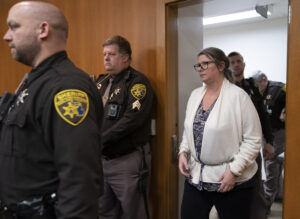Remembering the 49 People Who Died in Orlando’s Pulse Nightclub Attack
It's been a year since the deadliest mass shooting in U.S. history scarred countless lives and shook the city's gay community to its core. Mourners in Atlanta holding a vigil last year for those killed in the Pulse nightclub attack in Orlando, Fla. (David Goldman / AP)
Mourners in Atlanta holding a vigil last year for those killed in the Pulse nightclub attack in Orlando, Fla. (David Goldman / AP)
By Katie Mettler / The Washington Post
Mourners in Atlanta holding a vigil last year for those killed in the Pulse nightclub attack in Orlando, Fla. (David Goldman / AP)
For the first time since the massacre last June, when Orlando’s Pulse nightclub went from patrons’ safe haven to nightmare in a matter of seconds, owner Barbara Poma turned on the building’s outside lights Sunday – reminding mourners what it looked like before everything closed down.
Hues of pink and purple splashed across the bar’s black exterior and blue-green spotlights illuminated palm trees. The club’s logo – a large “P” – was projected on the wall.
It had been a year since the deadliest mass shooting in U.S. history stole 49 lives there and scarred countless others; a year since Pulse, a safe space for Orlando’s gay community, fundamentally changed.
Overnight, those directly touched by the June 12, 2016, tragedy – survivors and family of victims – gathered in the parking lot outside the club for a private memorial service. They weren’t allowed inside the building, which has been boarded up for months, but just being near the place was emotional enough.
“It’s totally different now. It’s like all the terrifying and awful memories I had have been replaced with tonight, with this unity and all this love,” Ramses Tinoco, who survived the massacre, told the Orlando Sentinel. “We’re all still grieving but this gave me some closure. I could smile and remember the 49.”
Only a couple hundred people were allowed into the private service. They huddled in close quarters on the inside of a fence erected around Pulse in the weeks after the shooting. Hundreds of other mourners stood on the other side, leaving candles and flowers at the base of the fence that over the last year because a permanent memorial.
Between the groups, men and women wearing white angel wings stood guard.
The memorial service didn’t begin until 1:45 a.m., with opening remarks from Poma about love and healing, which lasted through what would have been the final carefree moments of Pulse’s popular Latin night a year ago.
“What you have endured in the past year seems like something only you can understand,” Poma said to the people at the private memorial, according to the Orlando Sentinel. “Except here tonight, you are surrounded by hundreds of others who are like you.”
Then 2:02 a.m. arrived, the exact time gunman Omar Mateen fired his first bullet, and ministers read aloud the 49 names of the dead.
By the end of the night, more than 1,000 people had gathered to remember what happened last June, when Orlando became the first U.S. city of the summer – before Falcon Heights, Minnesota, and Baton Rouge and Dallas – to be upended by gun violence.
The fate of the physical building, once a haven now marred by bloodshed, is still unclear.
Last month, Poma announced her plans to turn the site into a memorial and museum by the year 2020.
Poma had initially planned to sell the Pulse property to the city for a negotiated $2.25 million, reported the Orlando Sentinel, but backed out of the deal in December. The city had plans to build a memorial there, an initiative Poma supported.
But she struggled with the idea of handing over the responsibility to outsiders, reported the Sentinel, especially since her reason for founding it in 2004 – as a memorial to her late brother, John – had been so intensely personal.
So she backed out of the sale deal and instead formed the onePULSE Foundation, a non-profit with goals of raising scholarship money and turning the former nightclub into a permanent memorial and museum.
“It isn’t easy for me to stand on this site,” Poma said last month, she announced her longterm plans for Pulse outside the club. “What began as a place for fun and joy is now sacred ground.”
Poma initially opened Pulse in 2004 as a place meant to embody the spirit of her late brother, John, who introduced her to the underground world of gay nightclubs when they were kids.
He died in 1991, after a long battle with HIV, and a decade later Poma decided to create a space that reminded her of her brother. She wanted her space to be loud and vibrant, “an atmosphere that embraced the gay lifestyle,” as The Washington Post has reported.
It wouldn’t be “just another gay club,” Poma decided, and it would bear a special name: Pulse, for John’s beating heart.
For 12 years, the club grew into an integral space for the gay community, one shattered within a matter of minutes by a madman with a gun. Poma wasn’t at the club the night of the shooting, but every day since she has felt a sense of responsibility to mend what happened there.
“It’s hard to come to grips with my new reality but it’s something I have to do,” she said in a promotional video on the onePULSE Foundation website. “It’s something I was called to do, and I’m honored to do it.”
Poma serves as director of the non-profit, which she formed in order to raise money for the planned memorial and museum. Singer Lance Bass and retired NBA player Jason Collins serve on its large board of trustees, and already celebrities Andy Cohen, Ellen DeGeneres and Lady Gage have given support.
Sara Brady, the foundation spokeswoman, told The Post that planning for the memorial and monument will happen in three phases. First, surveys will go out to survivors and the families of those who lost their lives at Pulse, asking for feedback on the fate of the building and the contents of the exhibits. Next, the first responders will be asked the same questions. Finally, the public will have a chance to contribute.
Poma has done “an extensive amount of homework,” Brady said, traveling across the country to visit the Oklahoma City bombing memorial and the 9/11 memorial. She met with the organizers and architects, studying the emotions evoked by each one.
“There is no one better to carry forth this mission,” Brady said.
During the day on Monday, the onePULSE Foundation will host two more memorial services open to the public, one at high noon and the other in the evening.
“It’s just a way to mark this dreadful anniversary and try to maybe use this as a starting point for real healing for everybody,” Brady said.
Your support matters…Independent journalism is under threat and overshadowed by heavily funded mainstream media.
You can help level the playing field. Become a member.
Your tax-deductible contribution keeps us digging beneath the headlines to give you thought-provoking, investigative reporting and analysis that unearths what's really happening- without compromise.
Give today to support our courageous, independent journalists.






You need to be a supporter to comment.
There are currently no responses to this article.
Be the first to respond.